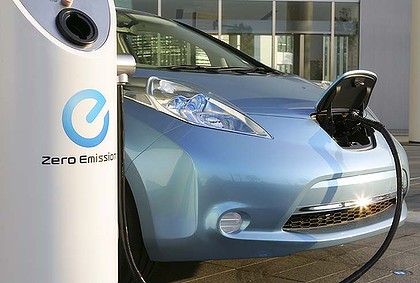New global car programs cost a lot, usually starting at $1 billion for a new platform and all the engineering, testing, and validation of the vehicle(s) it involves.
Now a high-ranking Nissan executive has given a glimpse of what the company is spending on its electric-car program: $4 billion.
Nissan's executive vice president for product planning, Andy Palmer, gave the $4 billion figure as an example of his company's all-in dedication to producing electric cars.
He made the comment at yesterday's final plenary session to wrap up the 26th annual Electric Vehicle Symposium in Los Angeles yesterday.
Nissan has made by far the boldest and most audacious bet on battery-electric vehicles of any automaker, similar in scale to Toyota's 1997 launch of what would become known as its Hybrid Synergy Drive technology.
Fifteen years later, Toyota has built almost two-thirds of all the hybrids on the planet (approximately 3 million), and is the company any car buyer thinks of when "hybrid" is mentioned.
Starting with the December 2010 launch of the Leaf electric hatchback, Nissan plans to roll out several more electric models over the next few years, including commercial vehicles and an electric luxury sedan previewed by the Infiniti LE Concept shown at last month's New York Auto Show.
With the starting price for a global automaker to develop a new "platform," or the underpinnings of an all-new model, at roughly $1 billion these days, Nissan's stated investment is the equivalent of four all-new models.
It's not a "bet your company" gamble, but it is a major commitment on a scale not seen from any other automaker.
General Motors has never said how much it invested in the Chevrolet Volt range-extended electric car, but its total is likely to be lower than Nissan's.

2012 Nissan Leaf
While Nissan has a joint venture with NEC, known as Automotive Electric Supply Corp., that fabricates and supplies the lithium-ion cells for the Leaf, GM relies on outside vendors for its lithium-ion batteries--LG Chem in the case of the Volt.
Most analysts believe Toyota put many billions of dollars into its hybrid program, sustaining losses for years before higher volume and lower component cost enabled it to break even.
Toyota has never said how long it lost money selling Prius hybrids before the program broke even. Many analysts suggest it wasn't until the second-generation Prius that Toyota stopped subsidizing every hybrid it sold.
Nissan is likely losing money right now on every Leaf it sells. Its volumes are low, and until its U.S. and U.K. factories ramp up next year, the high yen makes the Japanese-built Leaf very expensive to sell overseas.
Palmer all but acknowledged that, noting that his boss, CEO Carlos Ghosn, expects every car program to turn a profit, and "there's no reason the Leaf shouldn't be a profitable car over the life of the program."
Which is to say, Nissan most likely loses money on every Leaf it sells today.
+++++++++++













